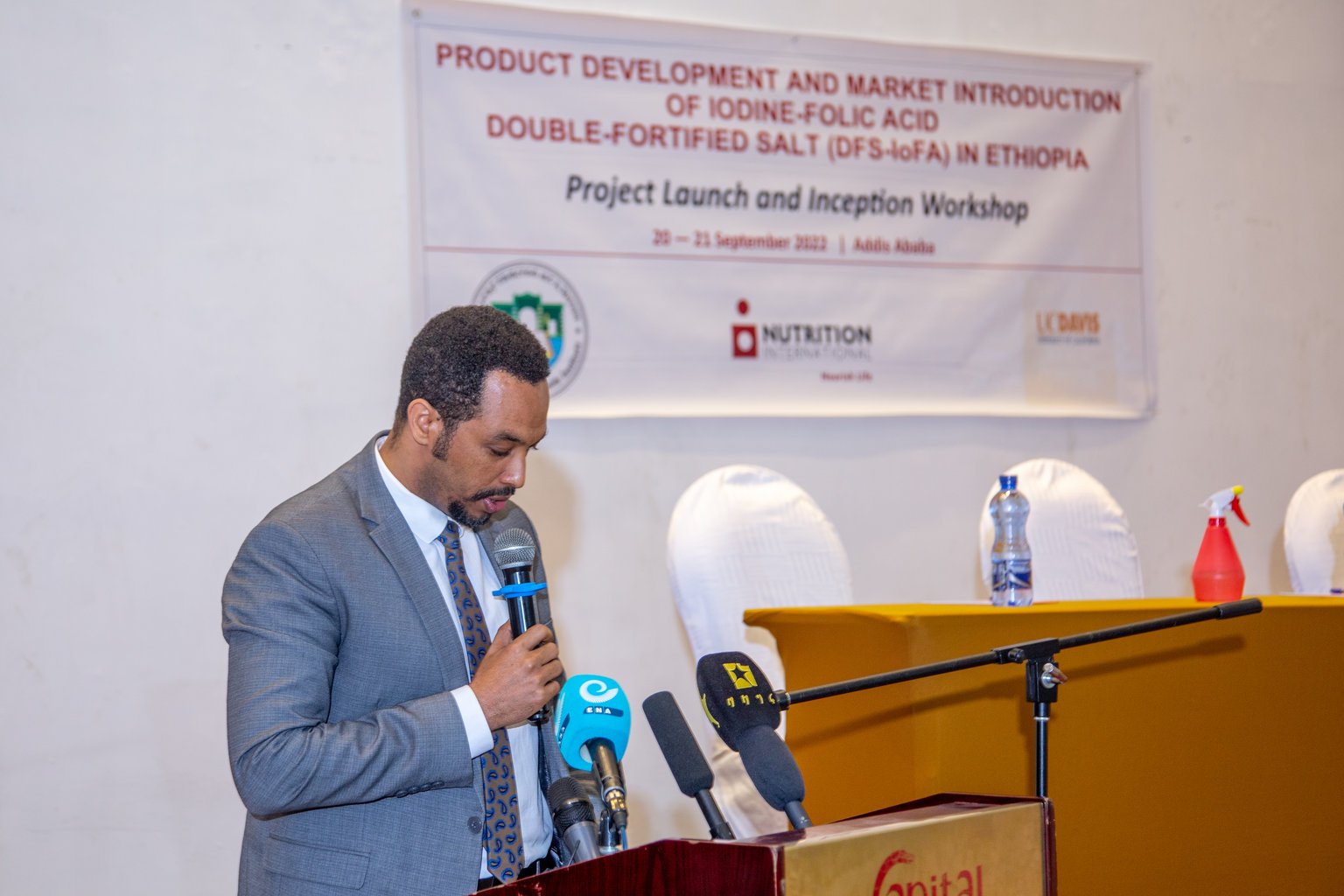News
Nutrition International highlights Canada-Africa partnership to advance nutrition, health and education goals
November 18, 2024
WP_Term Object
(
[term_id] => 48
[name] => News
[slug] => all-news
[term_group] => 0
[term_taxonomy_id] => 48
[taxonomy] => news-category
[description] => Stay up to date on our announcements, newest projects and partnerships, and news about how we’re making a difference in the lives of people around the world.
[parent] => 0
[count] => 272
[filter] => raw
)
Nutrition International and partners kick off iodine-folic acid double-fortified salt project in Ethiopia
Nutrition International and partners hold a launch event to mark the start of a three-year project that will introduce double-fortified salt with iron and folic acid to reduce the prevalence of neural tube defects in Ethiopia.
Posted on September 29, 2022
ADDIS ABABA, Ethiopia: On Sept. 19-20, 2022, the Government of Ethiopia, Nutrition International and the Bill & Melinda Gates Foundation held a kick-off event in Addis Ababa to mark the start of a three-year project aiming to enable the development and introduction of double-fortified table salt with both iodine and folic acid into the Ethiopian marketplace, which evidence suggests may help to significantly reduce the incidence of neural tube defects (NTDs) in the country.
The two-day event was attended by H.E. Dr. Dereje Duguma, State Minister, Ministry of Health, and by various stakeholders from the Ethiopian Public Health Institute, the Bill & Melinda Gates Foundation and Nutrition International, among others.

The objectives of the event were to present the project, identify the concerns, risks and needs of key sectors, and develop plans to address them in order to consolidate the buy-in of policy and program stakeholders.
“We believe that the current project proposed by EPHI, and Ethiopian experts is a newly designed innovative research project aimed at reducing micronutrient deficiencies and neural tube defects in Ethiopia and beyond,” said H.E. Dr. Dereje Duguma, State Minister, Ministry of Health during his keynote address. Duguma also informed stakeholders of the Ministry’s awareness that large-scale food fortification is the best solution to reduce NTDs, while pointing out that the coverage of industrially processed food consumption in Ethiopia remains below 50%.
Neural tube defects are a group of congenital anomalies that occur within the first 28 days of a pregnancy. The two most common NTDs are anencephaly, a serious birth defect in which a baby is born without parts of the brain and skull resulting in premature death (in utero or at birth), and spina bifida, a defect that affects the closure of the spine in a fetus.
Hospital-based studies show that the live birth rate of babies affected by NTDs in Ethiopia are significantly higher than the African average, reaching up to 13.8 per 1,000 births.
“Double fortification of salt with iodine and folic acid could be an innovative approach to eliminate folate deficiency of our pregnant mothers and to prevent children from NTD related sickness and death.
— H.E. Tarekegn Bulbuleta, State Minister, Ministry of Industry
While NTDs have devastating effects, a majority are preventable if a woman consumes enough folic acid before and during early pregnancy. However, for many populations consuming the required amount of folic acid through their diet can be challenging. Mandatory food fortification interventions, where staple foods such as wheat, rice and oil are fortified with folic acid, is an effective solution to reduce and prevent the high burden of NTDs in these populations.
“Food-based nutrition interventions like food fortification have a strong yet untapped potential to reinforce food and nutrition security at a critical time in a highly cost-effective way,” said Dr. Mandana Arabi, Nutrition International’s Vice President, Global Technical Services. “The impact potential is so high, that in a way, it’s astounding that we’re not at scale already because this is a top priority for governments – a ‘must-have’ rather than a ‘nice-to-have’.”
The project is expected to reach approximately 25,320,722 women of reproductive age and 11,653,102 adolescent girls – or more than 35% of the 2022 total population of Ethiopia, according to the population projection estimate by the Ethiopian Statistical Services.